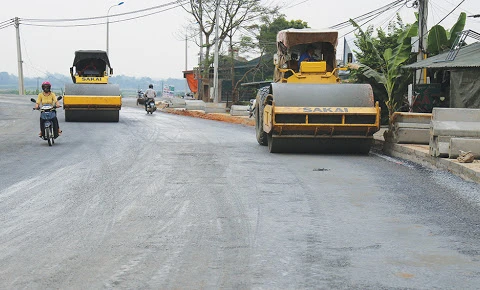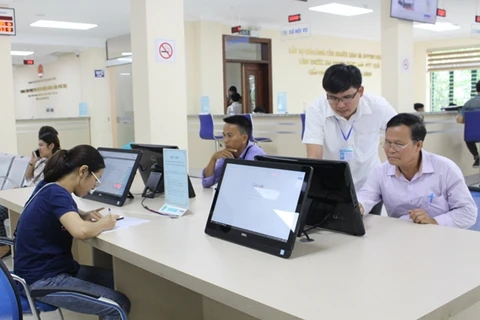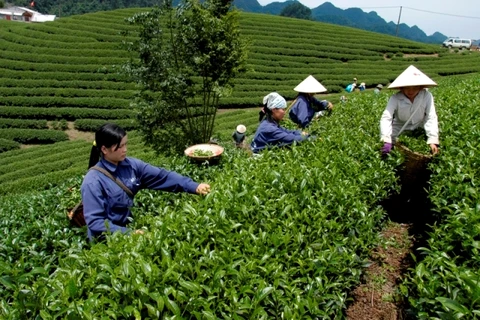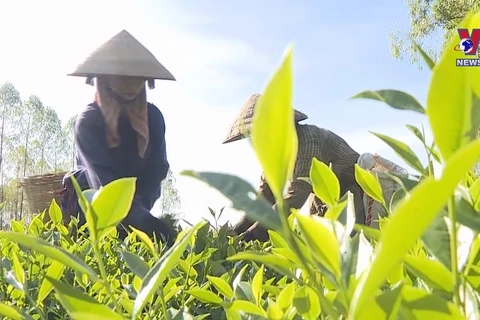Phu Tho (VNA) – Described as the cradle of Vietnam’s tea, the northern mountainous province of Phu Tho has carried out a host of measures to develop the crop in a sustainable manner and ensure its quality and food safety.
This has helped with developing the Phu Tho tea brand and turning the crop into its key agricultural staple.
Local farmers have primarily grown low-quality varieties that yield black tea for export with low returns, and this made them turn their back to the work. However, authorities have now introduced incentives to encourage them to expand cultivation areas and plant high-yield varieties instead.
Tea has gradually become a major contributor to local economic development and poverty reduction. Many villages, cooperatives, and processing firms specialising in tea production have been set up in the area, and they team up with one another to ensure raw materials, stable output, and clear product origin.
The Van Mieu cooperative is home to more than 20 ha of tea and has links with an additional 70 ha owned by local households to ensure safe production. The shift towards growing tea from traditional methods to safe production methods, however, requires proficiency and time-consuming techniques.
Vice Chairwoman of the Thanh Son District People’s Committee Dinh Thi Kieu An said the district has helped local residents improve the soil, use organic fertilisers, and replace old varieties of tea with high-quality ones with larger yields.
Output, along with quality, has increased significantly and hit an average of 13 tonnes per ha, she noted.
Established in 2017, the Phu Thinh cooperative in Phu Ho commune has built a concentrated production area spanning over 22 ha, yielding in excess of 500 tonnes of tea annually.
It has worked with the Northern Mountainous Agriculture and Forestry Science Institute to come up with new varieties and arrange training on safe tea production, food safety, and VietGap standards.
Products from the cooperative have gained a foothold in the market and tea viewed as a major crop of the commune.
Phu Tho province has more than 16,000 ha of tea, yielding more than 185,000 tonnes per year. Cultivation areas for new tea varieties represent 75.3 percent.
The province ships materials for processing black tea to countries such as India, China, Germany, the UK, and Pakistan.
Meanwhile, areas for green tea production have been zoned off in the districts of Tan Son, Thanh Son, and Doan Hung, among others.
To remove bottlenecks, the local agricultural sector and agencies have reviewed current tea production establishments.
Accordingly, there are 55 companies, each capable of processing 1 tonne of fresh tea leaves per day, together with 14 cooperatives, 18 villages, one farm, and nearly 900 small-sized processing establishments.
Some processing plants have linked up with cooperatives and tea-growing groups to guarantee stable material supplies and to control product quality. More than 3,300 ha of tea have been produced under safe procedures to date.
Phu Tho has also carried out the building of production models as part of the Quality and Safety Enhancement of Agricultural Products and Biogas Development Project (QSEAP), which are based in major tea-growing districts.
They serve as a basis for the production of high-quality tea that avoids the abuse of inorganic fertilisers and pesticides.
In the time to come, the province will continue to restructure its tea sector towards efficiency and sustainability. It is set to mobilise more than 118 billion VND (5.1 million USD) for projects improving productivity and quality.
At the same time, it will seek ways to switch to modern technologies and equipment, in a broad effort to increase product value and the incomes of tea growers while developing a Phu Tho tea brand./.

























